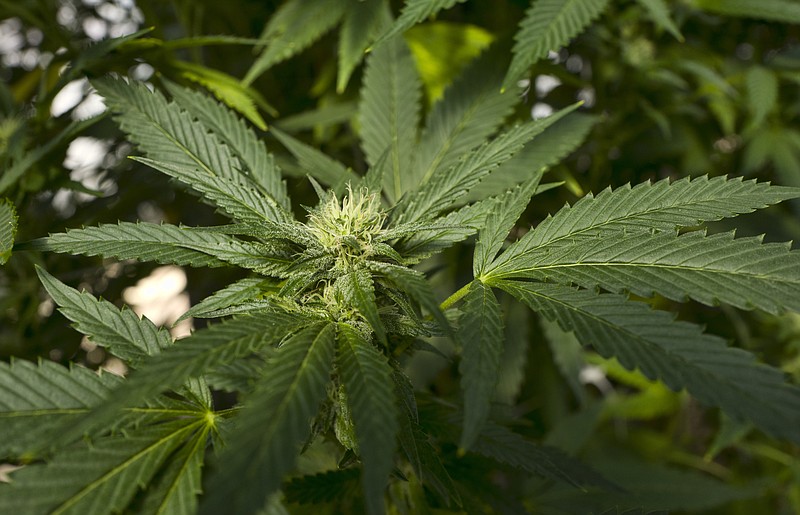Jefferson City is pursuing ways to regulate medical marijuana facilities, including proposing a required buffer between these facilities and some schools, churches and child care centers.
The Jefferson City Planning and Zoning Commission unanimously recommended approval of a proposed amendment to the zoning code that outlines some medical marijuana facility regulations. The Jefferson City Council will hold a public hearing and vote on the proposed zoning code amendment May 20.
In November, Missouri voters approved Constitutional Amendment 2, which legalized using marijuana for specific medical conditions.
The Missouri Constitution splits medical marijuana facilities into four categories:
Medical marijuana cultivation facility - a facility that farms, stores, transports and sells medical marijuana.
Medical marijuana testing facility - a facility that acquires, tests, certifies and transports medical marijuana.
Medical marijuana-infused products manufacturing facility - a facility that specializes in marijuana-infused products.
Medical marijuana dispensary facility - a medical marijuana retail establishment.
The proposed code refers only to medical marijuana cultivation and testing facilities, as well as medical marijuana-infused products manufacturing facilities. City staff plans to propose a separate ordinance for medical marijuana dispensary facilities in a few months, City Planner 1 Ahnna Nanoski said Thursday.
"We are choosing to do this in this phased method to incorporate these brand new legal uses into our codes slowly," Nanoski said.
Under the proposed amendment, medical marijuana testing, medical marijuana cultivation and medical marijuana-infused products manufacturing facilities would not be allowed within 1,000 feet of then-existing elementary and secondary schools, child care centers or churches.
This aligns with a recommendation by the Missouri Department of Health and Senior Services - tasked with the regulation, licensing and certification of medical marijuana facilities, Nanoski said.
Commissioner Blake Markus questioned whether the 1,000-foot buffer would create any legal issues, adding the amendment states it is unconstitutional if a city creates regulations that disallow medical marijuana facilities within city limits.
While there are several areas where these medical marijuana facilities would not be allowed under the proposed amendment, City Planning Manager Eric Barron said, "there's a fair portion of industrial zoning that is left that would be able to accommodate this use."
"I think it passes that test in terms of there still being ample opportunity to locate such facility," he added.
The city does have the ability to enact a lower separation requirement, Barron added.
Joy Sweeney, executive director of the Jefferson City-based Council for Drug Free Youth, told commissioners she would oppose lowering the separation requirement.
"One of the things we are concerned with is there are places and cities that are decreasing the 1,000-foot requirement," she said. "I really hope that Jefferson City is not one of those because that would definitely be detrimental to our city."
Since the proposed amendment does not include a measurement method, Markus said, he also worried about creating legal issues. After Markus expressed that concern, the commission recommended approval of the code amendment only if city staff align the method of measuring the 1,000-foot separation with Department of Health and Senior Services' rules.
Medical marijuana cultivation and testing facilities, as well as medical marijuana-infused products manufacturing facilities, would only be permitted in M-1 Light Industrial and M-2 General Industrial districts, under the proposed amendment.
Commissioner Jack Deeken questioned whether there would be a legal challenge by restricting the cultivation medical marijuana facilities to industrial uses, comparing the facilities to greenhouses.
"I understand keeping it where you want to keep it, but I just question if cultivating - you're putting it in a pot with soil and that's really no different than growing pansies," he said. "It's an agricultural process. You're using botany, plant physiology, no matter how you're growing it - you're growing a plant."
Greenhouses are permitted in the C-2 General Commercial and M-1 Light Industrial zoning districts, Barron said. However, he added, the method in which medical marijuana is grown is "more industrial."
"I believe that it's largely artificial light that's growing marijuana more so than a greenhouse, so I think if you toured a facility, you would probably see it as being more industrial in nature than agricultural," he said. "It's not a flower shop."
Any medical marijuana facilities licensed by DHSS must also comply with state requirements, regulations and procedures necessary for implementation and enforcement, the amendment states.
DHSS began accepting pre-filed application fees Jan. 5. It has received 471 pre-filed application forms - and a total of more than $3.3 million - as of March 28, according to its website.
DHSS will not finalize the regulations for the medical marijuana program until June 4. "Any preliminary efforts being conducted, such as background investigations, will not be accepted," its website states.
DHSS also will not accept patient identification card applications until July 4. If someone receives any physician certifications for medical marijuana, the certifications cannot be more than 30 days old at the time the person applies for a patient identification card, the website states.

